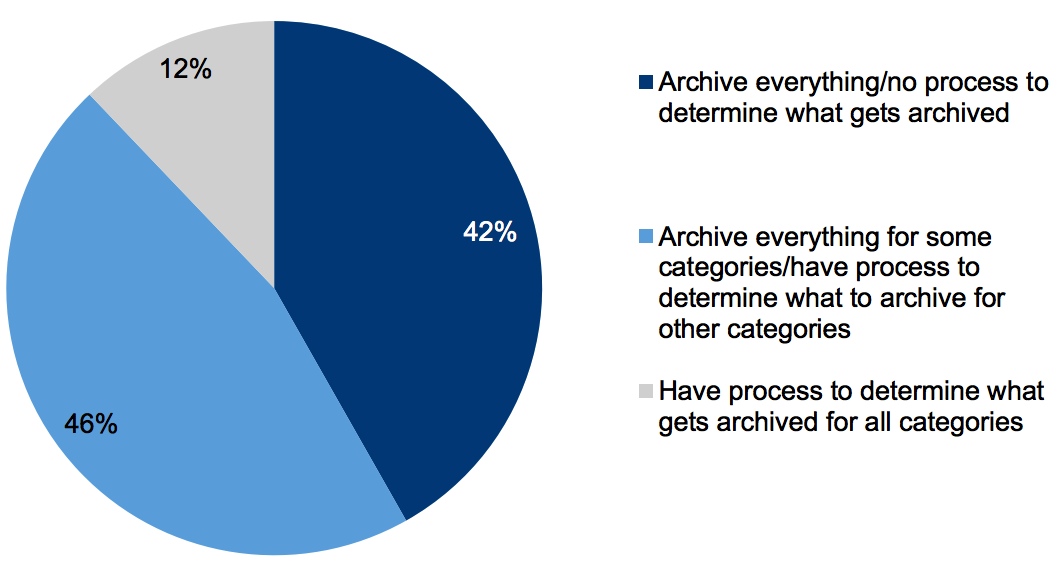Businesses Fail to Capture $10 Million+ in Potential Revenue Due to Poorly Managed Data Archives
IDC study sponsored by Iron Mountain
This is a Press Release edited by StorageNewsletter.com on June 29, 2015 at 2:47 pmIron Mountain, Inc. announced the results of the landmark study[i], Mining for Insight: Rediscovering the Data Archive, an IDC Corp.‘s white paper, sponsored by Iron Mountain.
The results confirm every executive’s worst nightmare: Organizations of all sizes and across industries are drowning in data, unable to effectively mine their data archives for key insights that could ultimately improve business outcomes. However, the findings also indicate that a subset of organizations are in fact successfully leveraging their data archives and the benefits are impressive – as much as an additional $10 million in revenue from streamlined IT and customer service operations.
88% of Companies Lack a Consistent Approach to Archiving Across All Data Types
Overall Approach to Data Archiving (n=1,011)
The research reveals that organizations with a well-defined data archive process stand to realize value from two potential avenues: cost savings and added revenue from monetizing archives. On the savings front, more than half of the organizations polled realized $1 million or more in savings over the past year from risk mitigation and avoidance of litigation, with the top 21% reporting savings of more than $10 million. Similarly, 44% of organizations reaped $1 million or more in savings stemming from reduced operational or capital costs, with the top 18% capturing more than $10 million.
More striking is an organization’s ability to draw new revenue from an effectively managed data archive. While 39% of companies surveyed benefited from an additional $1 million or more in revenue, the top 15 gained more than $10 milllion. On average, companies polled saw an additional $7.5 million in new revenue streams from their data archive.
Despite leaving money on the table, the majority of organizations – 76% – believe they are already maximizing the value of their archives, making data archiving a real blind spot for business leaders. With only 38% of companies using archives for business analysis, a critical process to drive additional revenue by better understanding markets, improving products and service delivery and better serving customers, it’s clear that the majority of respondents are not truly leveraging the power of their archive.
Of the 24% of businesses that acknowledge they could be leveraging their archives more effectively, nearly three quarters believe they could be extracting two times or more value than they realize today, with more than a quarter believing they could gain five times or more value.
To help organizations bridge the disconnect between perception and reality, Iron Mountain and IDC recommend organizations implement the following processes:
- Appoint a chief data officer to oversee and derive value from the data archive, while working closely with the chief operating and CIOs to set long-term business and data strategies.
- Develop information maps of all data sources and repositories (and their value) across the organization.
- Implement a holistic, consistent archiving strategy that addresses data retention schedules, use cases, the value of data, necessary accessibility and archive costs.
- Consider working with a third party vendor with specific expertise to help optimize your archiving solution while freeing up internal IT resources to focus on more strategic and innovative work.
Other Key Findings
- More data, more problems: Most companies maintain six or more electronic archives, storing a range of structured and unstructured data.
- Process makes perfect: A staggering 88% of organizations lack a uniform process for archiving across data types, making it hard to identify and access important information when needed.
- Organizations panic when confronting information overload: Without a clear process and pressure from the top to implement big data programs, more than 40% of organizations simply archive everything to avoid investing time and resources upfront to determine what’s truly important.
- Unclear archiving processes make data unusable: Over time, companies archiving everything quickly amass ‘data swamps,’ making data hard to find when needed, as opposed to the ‘data lakes’ many businesses aspire to create with a crystal clear data archiving strategy for quick and easy information retrieval.
Eileen Sweeney, SVP and GM, data management, Iron Mountain, said: “Data archiving isn’t just about meeting legal and compliance requirements anymore. The research shows that there are real financial benefits to be realized by implementing an effective data archiving strategy. To truly leverage the power of enterprise information, organizations must first take a hard look at their data management program. Even organizations with advanced archiving processes can stand to gain cost savings and additional revenue streams.”
Sean Pike, program director, e-discovery and information governance research, IDC, said: “There’s a real disconnect between the value people think they’re currently realizing from their archives and the potential additional revenue they could stand to gain by simply managing their data more effectively. However, organizations of all sizes and across all industries can expect to see an uptick in revenue and cost savings by revisiting their archives to fulfill business objectives. This is especially critical in today’s information-driven economy, where the key to success or failure comes down to how effectively businesses can manage data and how quickly they can act on that information.”
[i] IDC for Iron Mountain
IDC surveyed 1,011 members of senior and executive management involved in data archiving from organizations with more than 500 employees across a broad range of industries. Participating countries include the United States, Canada, the UK, France, Spain, Netherlands, Germany and Australia. Respondents were from IT departments and legal/compliance departments as well as lines of business. They were asked about their current archiving strategies and processes, the business value of their data archives and how satisfied they are with their access to archived information for a variety of business use cases.












 Subscribe to our free daily newsletter
Subscribe to our free daily newsletter
